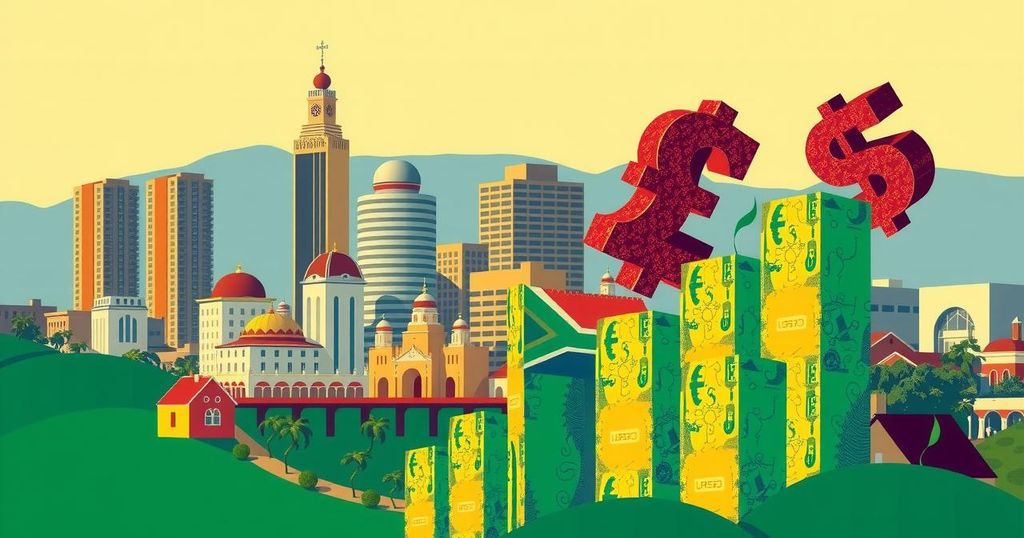South Africa Faces VAT Increase Amid Rising Living Costs
South Africa may increase VAT by 0.5 percentage points, potentially affecting low-income households and raising living costs. The PMBEJD predicts significant increases in grocery costs while observing that the hike could exacerbate financial burdens. Small businesses may struggle with operational cost increases, leading to economic challenges. Experts recommend alternative measures to alleviate fiscal pressures.
South Africa is currently confronting economic challenges as its government considers a proposed increase in the Value Added Tax (VAT). Finance Minister Enoch Godongwana announced the potential increment of 0.5 percentage points for the fiscal years 2025/26 and 2026/27, resulting in a total VAT rate of 16% by 2026/27. This proposal has raised concerns among citizens who are already struggling with the rising costs of living.
The expected VAT increase could impact nearly all goods and services, with the exception of a few items currently classified as zero-rated. An analysis from the Pietermaritzburg Economic Justice and Dignity Group (PMBEJD) suggested that a basic grocery basket could see an increase of approximately R375.16, culminating in a total grocery cost of R5,477.84. Additionally, essential toiletries and household products may experience price hikes, putting further pressure on families.
Observers indicate that the VAT hike will disproportionately affect lower-income households that allocate a substantial portion of their budgets to necessities like food and electricity. Compounding this challenge, ongoing electricity price increases of approximately 12.7% are predicted, aggravating the financial strain faced by many South African families.
Small businesses are anticipated to experience the challenges of rising operational costs as a result of the VAT hike. These difficulties may impede their competitiveness, possibly leading to job losses and broader economic downturns.
Notably, certain staple food items will continue to be exempt from VAT in an effort to mitigate the impact on lower-income households. Items such as brown bread, maize meal, and some vegetables will remain zero-rated, while additional items including edible offal and various canned goods will be added to this list effective May 1, 2025.
Economic experts have cast doubt on the efficiency of VAT increases as a means to address South Africa’s fiscal concerns, advocating for alternative revenue sources that would not exacerbate the strain on economically disadvantaged communities.
Following the budget announcement, which faced turmoil and led to a delay on February 19 due to disagreements over the VAT adjustments, the national economic outlook remains precarious. The government asserts the need for increased revenue to manage a significant budget deficit, but there are grave concerns among observers that such adjustments will render daily living increasingly unaffordable.
The South African tax system has been criticized for being one of the most burdensome globally, accompanied by high personal income taxes that contribute to almost 25% of the gross domestic product. Such financial pressures could hinder investment and growth while pushing households deeper into poverty.
Amid rising unemployment and stagnant economic growth, economic analysts urge strategies focused on job creation and economic stimulation to restore confidence and stability among the populace.
The government’s response to public dissent regarding the proposed VAT hike remains uncertain. Should these VAT increases be enacted amidst already rising living costs, the resultant reduction in consumer spending could deepen the ongoing economic malaise in South Africa.
As discussions continue and uncertainties loom, South Africans are encouraged to manage their budgets proactively, utilizing VAT-free food options while preparing for the forthcoming changes in their financial environment.
In summary, South Africa’s potential VAT increase poses significant economic challenges, particularly for low-income households already burdened by rising living costs. The proposed increment, along with mounting electricity costs, threatens to exert further financial strain on families and small businesses alike. While some staple food items will remain exempt from VAT to ease the impact, the overall economic outlook is tenuous, necessitating alternative strategies for revenue generation and a focus on job creation to restore economic stability.
Original Source: evrimagaci.org




Post Comment